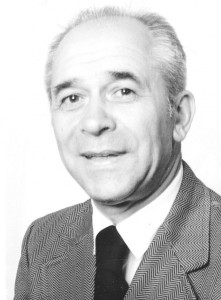
Vladimir Fedorovich Markov, a professor emeritus in the Slavic languages and literatures department and a Russian literature scholar, died Jan. 1 at his home in Los Angeles, after a long period of complications from Parkinson’s disease. He was 92.
Markov’s colleagues and friends knew him as a witty man with a passion for Russian poetry, classical music and animals. He guided graduate and undergraduate students in Russian literature as a professor at UCLA for 33 years, before retiring in 1990, said Ronald Vroon, chair of the department of Slavic languages and literatures at UCLA.
Markov’s expertise in Russian literature made UCLA a prominent school in the field, Vroon said.
“He was a scholar and a poet,” said Olga Kagan, director of the UCLA Center for World Languages and National Heritage Language Resource Center and a professor of Slavic language and literatures. “He didn’t just study poetry, he lived it.”
Markov grew up in Russia and pioneered the study of Russian avant-garde literature, a movement tied to the revolution and stretching from about the time of World War I to the 1930s. He was passionate about teaching Russian poetry and literature and used innovative techniques while teaching, said Olga Matich, a professor emerita in the Slavic languages and literatures department at UC Berkeley. She was a student of Markov’s as a young girl in Monterey, Calif., she said.
Markov taught at the Defense Language Institute in Monterey, Calif. for six years while working toward his doctoral degree in Slavic languages and literatures at UC Berkeley, before beggining to teach at UCLA in 1957. After retiring, he continued to do research and write publications on Russian poetry and his analysis on the topic, Vroon said.
Markov seemed very eager about his work; he would often frolic around the classroom acting out lines of poetry, Matich said.
Once, when teaching students about Russian poet Alexander Pushkin, Matich said Markov asked his students whether they would bring a box of matches or a volume of Pushkin poetry if they were stranded on a deserted island.
Markov then said to the class: “Poetry is much more important than practical things. One can’t survive without the beautiful in life”
Matich said it was her favorite memory of Markov.
“He got us into a very heated discussion,” she said.
Markov went out of his way to help students – sometimes even those who weren’t in his classes, Vroon said.
While Vroon was a graduate student working on his dissertation, he sent Markov a copy of his work, not thinking the prominent scholar would respond. Markov eventually did write him back with a lot of feedback and advice, Vroon said.
Vroon said Markov’s work inspired him in his research and interest in Russian Futurism, a modern movement in the visual arts and literatures.
The two later became colleagues and friends, when their time as professors at UCLA overlapped between 1987 and 1990.
“My favorite memory with Markov was sitting in his home office in Brentwood listening to him talk about Russian poetry,” Vroon said.
Markov loved poetry, his wife and his life in the United States, Kagan said. Markov’s wife died in 2001 and they had no children.
Markov’s funeral was on Jan. 7 at a Russian Orthodox church in Los Angeles. A memorial service has not been planned yet, Vroon said.